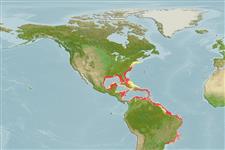Elasmobranchi (squali e razze) (sharks and rays) >
Carcharhiniformes (Ground sharks) >
Carcharhinidae (Requiem sharks)
Etymology: Rhizoprionodon: rhiza (Gr.), root; prion (Gr.) saw; odon (Gr.), tooth, referring to teeth with serrated (saw-like) bases, or roots [replacement name for Rhizoprion Ogilby 1915, preoccupied by Rhizoprion Jourdan 1861 in mammals]. (See ETYFish); terraenovae: terra (L.), earth or land; novus (L.), new, i.e., Newfoundland, Canada, where Richardson erroneously thought it occurred. (See ETYFish).
More on author: Richardson.
Environment: milieu / climate zone / depth range / distribution range
Ecologia
marino; salmastro demersale; distribuzione batimetrica 0 - 280 m (Ref. 26938), usually 0 - 10 m (Ref. 55195). Subtropical; 43°N - 25°S, 100°W - 32°W (Ref. 55195)
Western Atlantic: New Brunswick, Canada to the Gulf of Mexico. Southwest Atlantic: coasts of Brazil.
Length at first maturity / Size / Peso / Age
Maturity: Lm 87.5, range 85 - 90 cm
Max length : 110 cm TL maschio/sesso non determinato; (Ref. 37512); 110.0 cm TL (female); common length : 70.0 cm TL maschio/sesso non determinato; (Ref. 37512); peso massimo pubblicato: 7.3 kg (Ref. 40637); Età massima riportata: 10 anni (Ref. 6140)
Small, generally gray, streamlined shark, with long pointed snout. Posterior margin of anal fin straight or slightly concave. Second dorsal fin origin well behind anal fin origin (Ref. 26938).
Reaches at least 103 cm TL (Ref. 244). Abundant in the continental shelves, from the intertidal to deeper waters. Often occurs close to the surf zone off sandy beaches, and also enclosed bays, sounds, and harbors, in estuaries and river mouths. Feeds on small bony fishes, shrimps, crabs, segmented worms and mollusks (gastropod feet). Viviparous, with 1 to 7 young in a litter (Ref. 27549). Size at birth about 29 to 37 cm. Utilized for human consumption. Minimum depth from Ref. 055195.
Distinct pairing with embrace (Ref. 205). Viviparous, placental (Ref. 50449). 1 to 7 young per litter. Larger females carry more young. Size at birth 29-37 cm. Gestation period is 10 to 11 months in the northern Gulf of Mexico. Sex ratio of near term fetuses is 1:1 (Ref. 244).
Compagno, L.J.V., 1984. FAO Species Catalogue. Vol. 4. Sharks of the world. An annotated and illustrated catalogue of shark species known to date. Part 2 - Carcharhiniformes. FAO Fish. Synop. 125(4/2):251-655. Rome: FAO. (Ref. 244)
IUCN Red List Status (Ref. 130435)
Threat to humans
Harmless
Human uses
Pesca: pesca di sussistenza; Pesce da pesca sportiva: si
Informazioni ulteriori
CollaboratoriImmaginiStamps, Coins Misc.SuoniCiguateraVelocitàModalità di nuotoArea branchialeOtolithsCervelliVista
Strumenti
Special reports
Download XML
Fonti Internet
Estimates based on models
Preferred temperature (Ref.
123201): 23.4 - 28, mean 27 °C (based on 1016 cells).
Phylogenetic diversity index (Ref.
82804): PD
50 = 0.5078 [Uniqueness, from 0.5 = low to 2.0 = high].
Bayesian length-weight: a=0.00457 (0.00277 - 0.00754), b=3.01 (2.87 - 3.15), in cm total length, based on LWR estimates for this species & Genus-body shape (Ref.
93245).
Trophic level (Ref.
69278): 4.4 ±0.5 se; based on diet studies.
Resilienza (Ref.
120179): Molto basso, tempo minimo di raddoppiamento della popolazione più di 14 anni (K=0.19-0.45(?); tmax=10; tm=4; Fec 1-7).
Fishing Vulnerability (Ref.
59153): Moderate to high vulnerability (50 of 100).
Climate Vulnerability (Ref.
125649): Very high vulnerability (85 of 100).
Nutrients (Ref.
124155): Calcium = 23.3 [2.5, 120.6] mg/100g; Iron = 0.89 [0.24, 2.75] mg/100g; Protein = 22.6 [19.7, 24.8] %; Omega3 = 0.372 [0.150, 0.861] g/100g; Selenium = 25.1 [6.4, 70.6] μg/100g; VitaminA = 8.35 [2.78, 24.50] μg/100g; Zinc = 0.452 [0.218, 0.855] mg/100g (wet weight); based on
nutrient studies.
